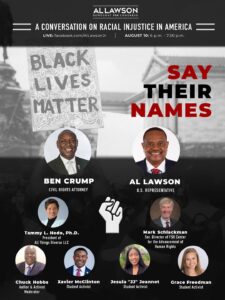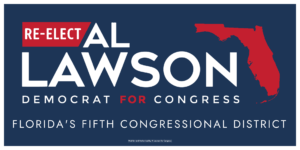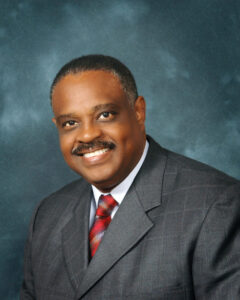
U.S. Rep. Al Lawson hosted the “Say Their Names: A Conversation on Racial Injustice in America” virtual community forum on Monday to discuss the importance of the Black Lives Matter movement. The forum also focused on possible solutions to racial injustice.
The FAMU graduate was accompanied by nationally prominent civil rights attorney Benjamin Crump and other community advocates as they discussed the biggest issue plaguing America besides COVID-19: racism.
Tallahassee attorney Chuck Hobbs moderated the discussion, posing many questions related to these topics.
Hobbs raised the question of why the Black Lives Matter movement matters. Panelist Tammy Hodo voiced her reasons as to why this movement carries such significance in 2020.
“Oftentimes when we say Black lives matter, I hear people say all lives matter,” she said. “The reality is all lives can’t matter until the most vulnerable lives within our society matter.”
Hodo sees the need for change in the treatment of African Americans.
“We just continue to see issues that show us that our lives don’t matter,” she said. “I don’t know if Black lives have ever mattered in America. We seem to be a group that is very much an afterthought and disregarded, and this needs to change.”

Hodo also expressed her concern for her child, who has to grow up facing adversity simply because of the color of his skin.
“I am the mother of a 17-year-old son, and I am terrified,” she said. “I should not have to be concerned with my son having an encounter with anyone and being killed just for the beautiful complexion that he has.”
College sophomore and student activist Grace Freedman also chimed in on the issue, discussing how those of other races, mainly white Americans, should back their Black peers in this race war in a way that shows support, but most importantly, respect.
“I think it’s important to note that while it’s incredibly important that we have a very diverse set of allies coming to support the Black Lives Matter movement, that people, especially white people, know their role within the movement, meaning it is that of support, uplifting Black voices, passing the mic, using their platform and position of privilege to help others who are more marginalized,” she said.
Freedman thinks it all boils down to the proper time and place.
“It’s incredibly important to be active allies and advocates, but to also note what is their time and when it is not their time to speak on behalf of certain issues, and when it is the proper time to pass the mic and elevate other individuals,” she said.
The strained relationship between people of color and police officers was also brought to the forefront for review.
Haitian native and student activist Jesula Jeannot gave her thoughts on how the extreme militarization of law enforcement has widened the rift between police and society, and what can be done to mend it.
“Many people from law enforcement know they will get away with things,” she said. “They have not been held accountable for their actions, so I feel like the main issue is the people who are higher up have to come up with a solution. If they know the consequences, now they’ll perhaps act better. It’s the relationship that you’re creating with that community, finding that transparency between citizens and law enforcement and people higher up.”
Hobbs, the moderator, presented one potent question: Can law enforcement stop these extreme incidents from occurring themselves or will it require legislative action?

Freedman weighed in. “I definitely support reforms when they are made, but I think that there is a certain extent in which reforms can impact a historically racist occupation,” she said. “I believe that then it comes down to holding our government accountable in saying whether we can redirect the funds and take an active role,” she said. “I think ultimately it boils down to whether the government is going to intervene and actively redirect some of those funds that come from the policing organizations and redirect them to more beneficial things for the community.”
Student activist Xavier McClinton shared a more humanistic take.
“It takes a holistic interaction with diversity, understanding of inclusion and understanding of the community that you’re policing and understanding how you interact with people,” he said. “It’s a humanity thing and you can’t just take a one-sided approach to it. It’s going to take different levels to the approach to really fix the situation.”
As the forum came to a close, Congressman Lawson expressed his gratitude to the panelists and confirmed that they were on the right track toward change.
“For you all to serve together tonight is a step forward to make sure that we create a movement,” he said.
Lawson, hoping to win a third term, will face two opponents in the Democratic primary later this month. His district stretches across North Florida from Gadsden County to Jacksonville and includes parts of Leon County, including FAMU’s campus.